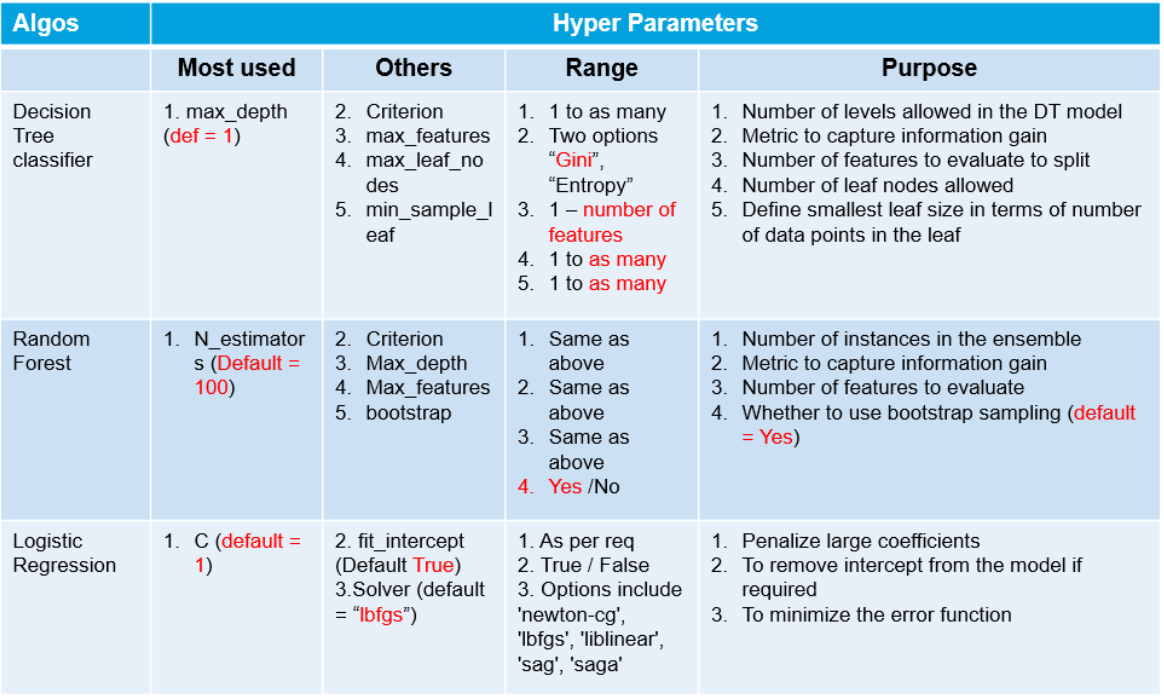机器学习4个常用超参数调试方法
ML工作流中最困难的部分之一是为模型找到最好的超参数。ML模型的性能与超参数直接相关。超参数调优的越好,得到的模型就越好。调优超参数可能是非常乏味和困难的,更像是一门艺术而不是科学。
超参数
超参数是在建立模型时用于控制算法行为的参数。这些参数不能从常规训练过程中获得。在对模型进行训练之前,需要对它们进行赋值。

1. 传统手工搜索
在传统的调参过程中,我们通过训练算法手动检查随机超参数集,并选择符合我们目标的最佳参数集。
我们看看代码:
#importing required libraries from sklearn.neighbors import KNeighborsClassifier from sklearn.model_selection import train_test_split from sklearn.model_selection import KFold , cross_val_score from sklearn.datasets import load_wine wine = load_wine() X = wine.data y = wine.target #splitting the data into train and test set X_train,X_test,y_train,y_test = train_test_split(X,y,test_size = 0.3,random_state = 14) #declaring parameters grid k_value = list(range(2,11)) algorithm = ['auto','ball_tree','kd_tree','brute'] scores = [] best_comb = [] kfold = KFold(n_splits=5) #hyperparameter tunning for algo in algorithm: for k in k_value: knn = KNeighborsClassifier(n_neighbors=k,algorithm=algo) results = cross_val_score(knn,X_train,y_train,cv = kfold) print(f'Score:{round(results.mean(),4)} with algo = {algo} , K = {k}') scores.append(results.mean()) best_comb.append((k,algo)) best_param = best_comb[scores.index(max(scores))] print(f'\nThe Best Score : {max(scores)}') print(f"['algorithm': {best_param[1]} ,'n_neighbors': {best_param[0]}]")
Score:0.6697 with algo = auto , K = 2 Score:0.6773 with algo = auto , K = 3 Score:0.7177 with algo = auto , K = 4 Score:0.734 with algo = auto , K = 5 Score:0.7017 with algo = auto , K = 6 Score:0.7417 with algo = auto , K = 7 Score:0.7017 with algo = auto , K = 8 Score:0.6533 with algo = auto , K = 9 Score:0.6613 with algo = auto , K = 10 Score:0.6697 with algo = ball_tree , K = 2 Score:0.6773 with algo = ball_tree , K = 3 Score:0.7177 with algo = ball_tree , K = 4 Score:0.734 with algo = ball_tree , K = 5 Score:0.7017 with algo = ball_tree , K = 6 Score:0.7417 with algo = ball_tree , K = 7 Score:0.7017 with algo = ball_tree , K = 8 Score:0.6533 with algo = ball_tree , K = 9 Score:0.6613 with algo = ball_tree , K = 10 Score:0.6697 with algo = kd_tree , K = 2 Score:0.6773 with algo = kd_tree , K = 3 Score:0.7177 with algo = kd_tree , K = 4 Score:0.734 with algo = kd_tree , K = 5 Score:0.7017 with algo = kd_tree , K = 6 Score:0.7417 with algo = kd_tree , K = 7 Score:0.7017 with algo = kd_tree , K = 8 Score:0.6533 with algo = kd_tree , K = 9 Score:0.6613 with algo = kd_tree , K = 10 Score:0.6697 with algo = brute , K = 2 Score:0.6773 with algo = brute , K = 3 Score:0.7177 with algo = brute , K = 4 Score:0.734 with algo = brute , K = 5 Score:0.7017 with algo = brute , K = 6 Score:0.7417 with algo = brute , K = 7 Score:0.7017 with algo = brute , K = 8 Score:0.6533 with algo = brute , K = 9 Score:0.6613 with algo = brute , K = 10 The Best Score : 0.7416666666666667 ['algorithm': auto ,'n_neighbors': 7]
缺点:
- 没办法确保得到最佳的参数组合。
- 这是一个不断试错的过程,所以,非常的耗时。
2. 网格搜索
网格搜索是一种基本的超参数调优技术。它类似于手动调优,为网格中指定的所有给定超参数值的每个排列构建模型,评估并选择最佳模型。考虑上面的例子,其中两个超参数k_value =[2,3,4,5,6,7,8,9,10] & algorithm =[' auto ', ' ball_tree ', ' kd_tree ', ' brute '],在这个例子中,它总共构建了9*4 = 36不同的模型。
from sklearn.model_selection import GridSearchCV knn = KNeighborsClassifier() grid_param = { 'n_neighbors' : list(range(2,11)) , 'algorithm' : ['auto','ball_tree','kd_tree','brute'] } grid = GridSearchCV(knn,grid_param,cv = 5) grid.fit(X_train,y_train) #best parameter combination grid.best_params_ #{'algorithm': 'auto', 'n_neighbors': 5} #Score achieved with best parameter combination grid.best_score_ #0.774 #all combinations of hyperparameters grid.cv_results_['params'] #average scores of cross-validation grid.cv_results_['mean_test_score']
至于为什么二者的结果会不一样,那是因为seed种子数也是一个超参数
缺点:
由于它尝试了超参数的每一个组合,并根据交叉验证得分选择了最佳组合,这使得GridsearchCV非常慢。
3. 随机搜索
使用随机搜索代替网格搜索的动机是,在许多情况下,所有的超参数可能不是同等重要的。随机搜索从超参数空间中随机选择参数组合,参数由n_iter给定的固定迭代次数的情况下选择。实验证明,随机搜索的结果优于网格搜索。
from sklearn.model_selection import RandomizedSearchCV knn = KNeighborsClassifier() grid_param = { 'n_neighbors' : list(range(2,11)) , 'algorithm' : ['auto','ball_tree','kd_tree','brute'] } rand_ser = RandomizedSearchCV(knn,grid_param,n_iter=10) rand_ser.fit(X_train,y_train) #best parameter combination rand_ser.best_params_ #{'n_neighbors': 7, 'algorithm': 'brute'} #score achieved with best parameter combination rand_ser.best_score_ #0.7256666666666667 #all combinations of hyperparameters rand_ser.cv_results_['params'] #average scores of cross-validation rand_ser.cv_results_['mean_test_score']
缺点:
随机搜索的问题是它不能保证给出最好的参数组合。
4. 贝叶斯搜索
贝叶斯优化属于一类优化算法,称为基于序列模型的优化(SMBO)算法。这些算法使用先前对损失f的观察结果,以确定下一个(最优)点来抽样f。该算法大致可以概括如下。
- 使用先前评估的点X1*:n*,计算损失f的后验期望。
- 在新的点X的抽样损失f,从而最大化f的期望的某些方法。该方法指定f域的哪些区域最适于抽样。
重复这些步骤,直到满足某些收敛准则。
from skopt import BayesSearchCV import warnings warnings.filterwarnings("ignore") # parameter ranges are specified by one of below from skopt.space import Real, Categorical, Integer knn = KNeighborsClassifier() #defining hyper-parameter grid grid_param = { 'n_neighbors' : list(range(2,11)) , 'algorithm' : ['auto','ball_tree','kd_tree','brute'] } #initializing Bayesian Search Bayes = BayesSearchCV(knn , grid_param , n_iter=30 , random_state=14) Bayes.fit(X_train,y_train) #best parameter combination Bayes.best_params_ #OrderedDict([('algorithm', 'ball_tree'), ('n_neighbors', 5)]) #score achieved with best parameter combination Bayes.best_score_ #0.7741935483870968 #all combinations of hyperparameters Bayes.cv_results_['params'] #average scores of cross-validation Bayes.cv_results_['mean_test_score']
缺点:
要在2维或3维的搜索空间中得到一个好的代理曲面需要十几个样本,增加搜索空间的维数需要更多的样本。



 浙公网安备 33010602011771号
浙公网安备 33010602011771号